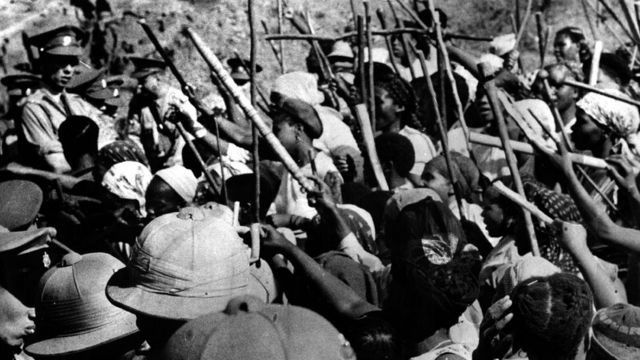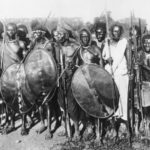The Aba Women’s Riots was one of the major anti-colonial movements and events that took place in the colonial history of Nigeria. The riots led by women in the provinces of Calabar and Owerri in November and December of 1929, became the first major revolt by women in West Africa and is considered by many scholars, a prelude to the emergence of mass African nationalism.
The protests broke out when thousands of Igbo women from the Bende District, Umuahia, and other places in southeastern Nigeria traveled to the town of Oloko to protest against the Warrant Chiefs and some of the policies imposed by British colonial administrators. The riot took months for the government to suppress and became a historic example of feminist and anti-colonial protest.
Background To The Protest
The roots of the Aba Women’s Riots can be traced to the indirect rule system established by the British Government in Colonial Nigeria. As the name of the systems projects, the colonial government ruled the colony through existing traditional institutions in the North and the West and established a Warrant chief system in the Southeastern part of the country as it was an acephalous community right before the arrival of the British.
Within a few years, the appointed warrant chiefs became increasingly oppressive. They seized property, imposed draconian local regulations, and began imprisoning anyone who openly criticized them. Although much of the anger was directed against the warrant chiefs, most Nigerians knew the source of their power, British colonial administrators.
Colonial administrators added to the local sense of grievance when they announced plans to impose special taxes on the Igbo market women. These women were responsible for supplying food to the growing urban populations in Calabar, Owerri, and other Nigerian cities. They feared the taxes would drive many of the market women out of business and seriously disrupt the supply of food and non-perishable goods available to the populace.
The Okolo Conflict
Although they were existing grievances against the conduct of the Warrant Chiefs and the plans of direct taxation by the colonial authority, the tip that sparked off the protest, was a dispute between a woman named Nwanyeruwa and a man, Mark Emereuwa, who was helping to make a census of the people living in the town in relation to the taxation.
On the morning of November 18, Emereuwa arrived at Nwanyereuwa’s house and approached her, since her husband Ojim had already died. He told the widow to “count her goats, sheep, and people.” Nwanyereuwa, however, got angry believing she was going to be taxed based on her possession. She replied by saying “Was your widowed mother counted?,” meaning “that women don’t pay tax in traditional Igbo society.”
The two exchanged angry words, and Emeruwa grabbed Nwanyeruwa by the throat. Nwanyeruwa went to the town square to discuss the incident with other women who happened to be holding a meeting to discuss the issue of taxing women. Believing they would be taxed, based on Nwanyeruwa’s account, the Oloko women invited other women (by sending leaves of palm oil trees) from other areas to protest the injustice.
Read More
- Bussa Rebellion of 1816
- The Mau Mau Uprising In Colonial Kenya
- The Roles of Chartered Companies in Colonia Africa.
The Protest
In November of 1929, thousands of Igbo women congregated at the Native Administration centers in Calabar and Owerri as well as smaller towns to protest both the warrant chiefs and the taxes on the market women.
Using the traditional practice of censoring men through all-night song and dance ridicule (often called “sitting on a man”), the women chanted and danced, and in some locations forced warrant chiefs to resign their positions.
The women also attacked European-owned stores and Barclays Bank and broke into prisons and released prisoners. They also attacked Native Courts run by colonial officials, burning many of them to the ground. Colonial Police and troops were called in.
They fired into the crowds that had gathered at Calabar and Owerri, killing more than 50 women and wounding over 50 others. During the two-month “war” at least 25,000 Igbo women were involved in protests against British officials.
Aftermath
The Aba Women’s riots prompted colonial authorities to drop their plans to impose a tax on the market women and to curb the power of the warrant chiefs. In 1930 the colonial government abolished the system of warrant chieftains and appointed women to the Native Court system. The women’s uprising is seen as the first major challenge to British authority in Nigeria and West Africa during the colonial period.
As a result of the protests, the position of women in society was greatly improved. In some areas, women were able to replace the Warrant Chiefs. After the Women’s War, women’s movements were very strong in Ngwaland, many events in the 1930s, 40s, and 50s were inspired by the Women’s War, including the Tax Protests of 1938, the Oil Mill Protests of the 1940s in Owerri and Calabar Provinces and the Tax Revolt in Aba and Onitsha in 1956


